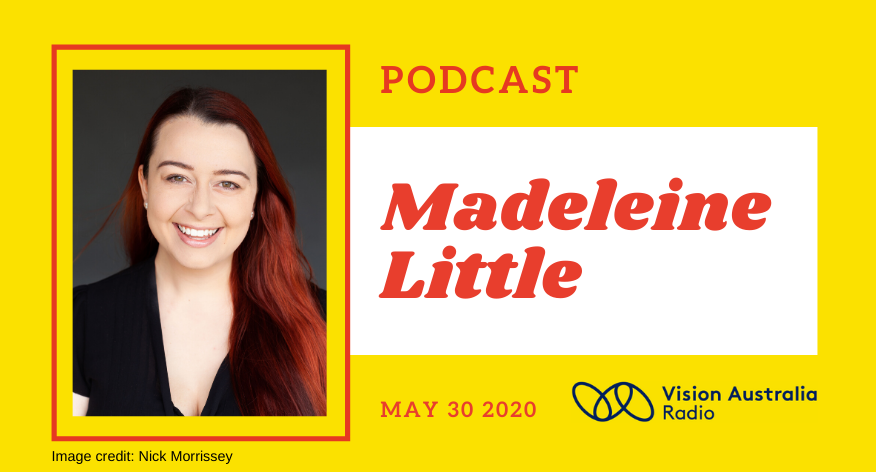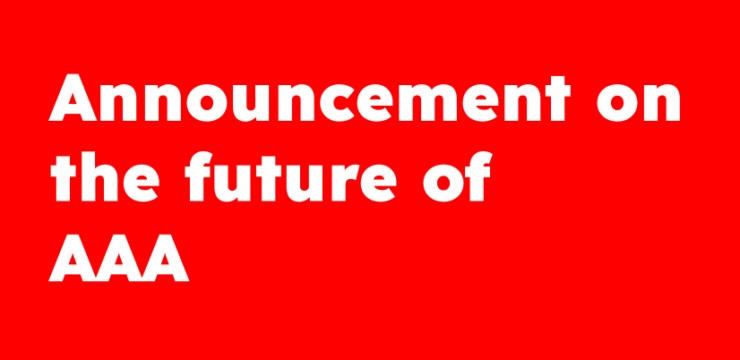PODCAST: Madeleine Little chats with Vision Australia Radio

Listen to the interview via Vision Australia Radio. The interview begins 25 minutes and 54 seconds into the program.
Download the audio of the program. The interview begins at 25 minutes and 54 seconds.
Transcript
Vision Australia Radio (Adelaide)
Interviewer: Peter Greco
Interviewee: Madeleine Little
Date: 30 May 2020
Program: Leisure Link
[Interview begins]
Peter: We’re delighted to welcome to the program Madeleine Little who last year won the Arts Access Australia Leadership Award – the inaugural award. Madeleine, congratulations and welcome!
Madeleine: Thank you so much. Thank you for having me.
Peter: What’s it like, I mean you’ve won the first one of these ever to be announced. So that’s a feather in your cap right from the start.
Madeleine: Oh gosh, it was the most overwhelming honour. I’m pretty sure I cried almost instantly when I got the phone call. [Laughing]. It wasn’t pretty but it was a very warm feeling. I’m very, very grateful.
Peter: Well it obviously it meant a lot to you. Tell us a bit about why you applied and why went for it, and then we’ll talk a bit about your career.
Madeleine: For sure. As a disabled artist, throughout my undergraduate drama degree and various studies, I couldn’t really see anyone in the industry that I could look up to who had the same sort of background and experience as a disabled theatre-maker and performer. I needed someone I could relate to and I didn’t have that. And I think I’ve just – at the point of applying for the award, I reached a point where I was like, I think if I can’t see that person that I could aspire to be, then maybe if I can do whatever I can to make change myself and hopefully I can help make the industry just a little bit more inclusive and welcoming for other artists as well. So that’s why I kind of felt like leadership is where I want to go in my career. I want things to be easier for the next lot of artists. And that’s what led me to apply and what led me here.
Peter: So I mean people with disabilities in general probably find it tougher in a lot of areas for employment … Do you think it may be even tougher in the arts and especially for someone to be trailblazing before you?
Madeleine: Absolutely. The arts is a very brutal industry at times so there are only a few roles to go around. So there is a history of rejection – or polite knock backs shall we say. But then for disabled artists, too, you’re competing against able-bodied, you know, hearing and sighted peers who might have more experience, but they’ve also had more training opportunities because those opportunities have been more accessible to the abled folk. And so that’s definitely something that I found. I’m very privileged that I was able to get a tertiary education in drama, but it wasn’t easy. I did come up against a lot of pushback from well-meaning people saying, you probably shouldn’t pursue an acting career because your body is too different, or you’re not able to do things in the same way so you’ll never get hired. I think it’s attitudinal all the barriers that we face primarily, and then of course there’s the access barriers as well. I definitely say it would be more difficult for d/Deaf and disabled artists in the industry then the abled or non-disabled folk.
Peter: And do you think that’s from maybe people that were advising you? Maybe the general public don’t think like that, or do they do you think as well?
Madeleine: Oh six of one, half a dozen to the other I reckon! I think I’ve definitely had a lot of people ask when I’m going to start my teaching degree as a back-up plan [Laughter].
Peter: [Laughter] Is that a compliment or an insult?
Madeleine: Oh look, I don’t know. I think there’s a general disbelief about pursuing a career in the arts anyway, so I think that the sceptical people probably remain sceptical. I definitely believe that unless we are out there you know, winning awards for example, or doing shows that have received tons of accolades and positive reviews. If we’re not succeeding, we are being doubted. Basically that’s the experience that I’ve had. I don’t think mainstream audiences or the general public are really on board unless they’re somewhat invested in disabled artists. That’s been my experience anyway, but I’d like to think that there’s a positive shift coming in that we’re getting a little bit more momentum going, so here’s hoping that continues.
Peter: I’m sure you’d be part of it. And of course, the margin for error isn’t very great is it, that if you bomb out in some performance or production, second chances might be a long time coming.
Madeleine: Oh absolutely, absolutely. I think any actor fears the moment where they might flub a line here or there and it might be a reason not to hire them again. But I definitely feel that for myself as an artist, I go – what if I’m in a lot of pain that day and I can’t move the exact same way that I did in the rehearsal before it? Is that going to be a reason not to hire me in the future – what’s going to happen there? What happens if I need to sit down? What happens if I just can’t move? It’s definitely a much narrower margin of error.
Peter: Not important in a sense, but I guess for our listeners that might not be aware, do you want to tell us a bit about your disability?
Madeleine: Sure. So, I am a proud disabled woman. I have a muscle condition called central core myopathy. And basically I’m really, really weak and walking is not my favourite thing to do in the world. I can do it, but I look a little weird. And yeah, I mostly enjoy sitting [Laughter].
Peter: Okay what got you into the arts degree in the first place – in the drama class, or university, what started you on that course?
Madeleine: I’ve always been into the arts from a very, very young age. As a kid I just wanted to be the next Hilary Duff, let’s be honest. [Laughter]. I wanted to be singing and dancing and performing in movies and all that jazz. I did piano lessons growing up and I did choir at school, did music and drama. And then the time came to pick what courses you wanted to do in applying for university, and drama just really stood out to me something that I wanted to look into. And we had about three or four weeks of doing drama at university it was pretty clear that I was doing the right thing, because as I just felt this passion for it. And I think my first lead role with a student theatre company as well just really cemented that I was meant to do theatre in one way or another. And that if I couldn’t access theatre because of attitudinal barriers that prevented me as a disabled artist from performing, then maybe I just needed to do something about that and show them that there’s no reason I can’t do it.
Peter: You’ve been described as a great advocate. We might have to save that topic for another day. But what about going through uni and those opportunities. Were universities and your fellow students a bit more understanding than maybe, you know, say through high school or the general communities? Is that too much of a stereotype?
Madeleine: Oh look, I think it’s also very much dependent on where you are within yourself and how you view yourself. So I think in high school I definitely had a much more negative outlook on disability and I tried not to focus on it or to think about it too much. And that very much coloured how I interacted with teachers and peers. It was something that – unless I absolutely had to talk about, it then I tried not to. When I reached university I found that the other people in the course with me were predominantly very supportive and welcoming and warm. But it’s really hard because the Bachelor of Fine Arts drama course that I undertook is designed for non-disabled people. And so, you’re in a position where you’re 18 or 19 and having to advocate for yourself a little more than your friends do. It can be an isolating experience that you don’t really know how to talk about unless you go through your own journey in terms of figuring out how you feel about disability and how you feel about yourself. Since I’ve discovered the social model of disability I’ve felt a lot more comfortable with it. And I think my experiences with peers and leaders in the industry or even educators have been a lot more positive, I think probably because I’ve put out a more positive vibe about who I am and how proud I am to be disabled.
Peter: We are in 2020 now, you’d hope that people slowly but surely start to catch up.
Madeleine: Yeah, exactly.
Peter: We talked about how difficult it is to get to work in the area of arts. And in terms of payment, people with disabilities are much worse off, aren’t they? There are facts and figures to prove that?
Madeleine: You know what I believe so. I mean at the moment with the pandemic that’s happening…
Peter: Well at the moment it’s probably a bit skewed anyway. But I think I was reading somewhere that artists with disabilities compared to able-bods were earning a lot less on a per annum basis.
Madeleine: Absolutely. If anyone wants to go to the Arts Access Australia website I’m pretty sure they do have those facts and figures there [Factsheet: Arts and Disability in Australia (doc, 49KB)] which I would highly recommend reading through. Definitely my experience has been unless I’ve been advocating for it, or the people have been working with have been advocating for it, there is a tendency to pay us less. There is a tendency to ask us to do things for free. Certainly in the arts, I also understand that when you’re in the emerging phase of your career you do have a tendency to take on passion projects that you might not get paid for, but there’s definitely a difference between, I really want to do this show with my friends just because I believe in it, and then being asked to work a full-time equivalent on a performance and not receive payment for it. Particularly if other people are gaining some sort of monetary benefit from it. Disabled artists, I think our work is undervalued significantly and I’ve been thinking about that a lot. I think it’s because of the way that we’re valued by non-disabled people. If we just kind of look at art as art maybe expand our view as to what professional standards might be, then I think people will find that we’re definitely worth throwing money at.
Peter: [Laughter] Yeah, throw as much money as you like. I mean being paid less, that’s discrimination right there.
Madeleine: Absolutely, absolutely. It’s subtle discrimination but it’s discrimination none the less.
Peter: Madeleine we’re out of time but we could talk for a lot longer. Now that we’ve made contact we’d love to get you back.
Madeleine: Thank you for having me.
Peter: Madeleine Little, who last year won Arts Access Australia’s Leadership Award.
[Interview ends]
Latest Posts

Notice of Extraordinary General Meeting
An Extraordinary General Meeting of members of Arts Access Australia will be held on 14 October 2024 from 1:00pm (AEDT)

Announcement on the future of AAA
Arts Access Australia's Board of Directors' announcement of company's future operations.



